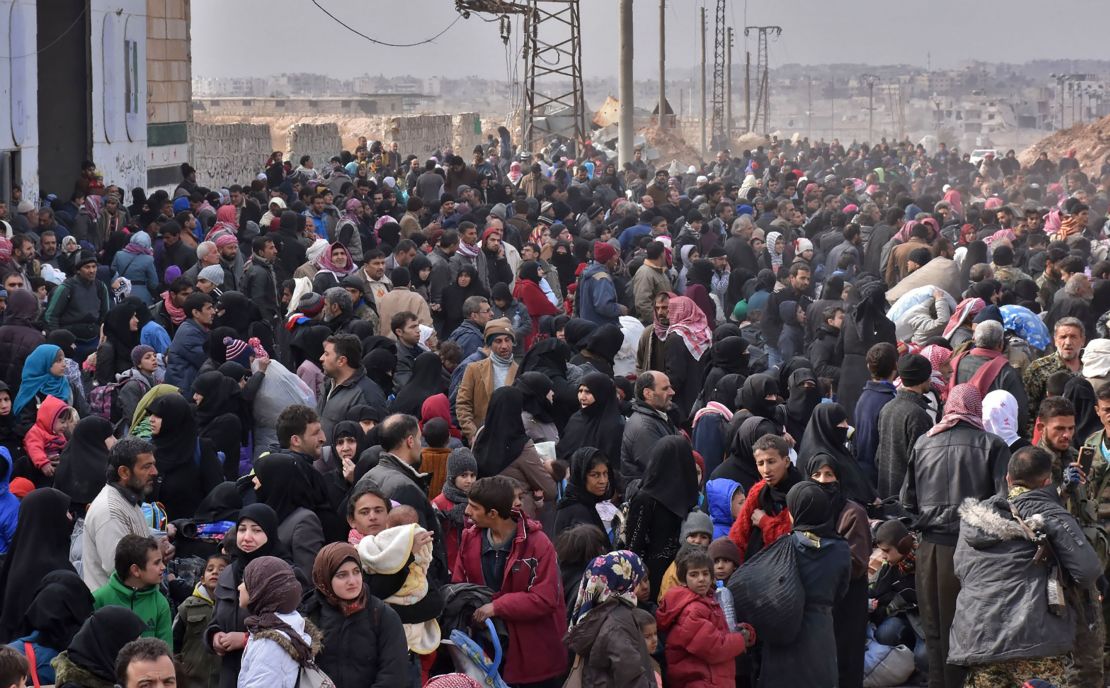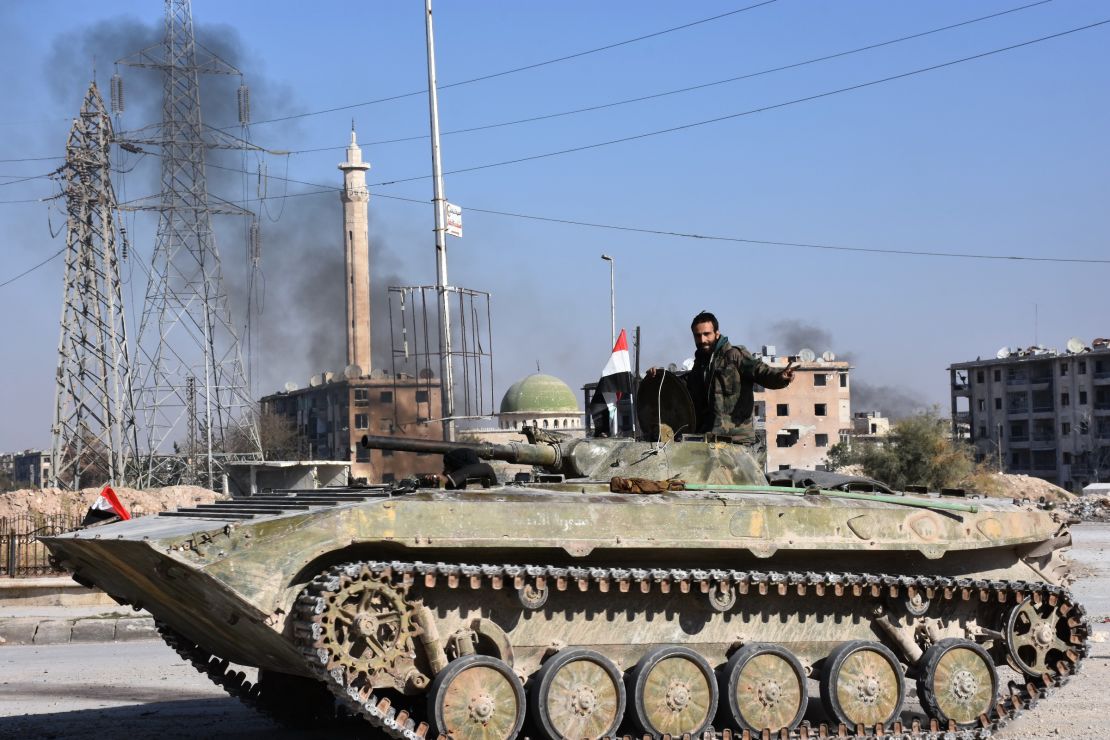Editor’s Note: An earlier version of this article included an incomplete quotation from a boy displaced from Aleppo. This updated version of the story expands the boy’s quote to include his reference to a cluster bomb falling on the roof of his home.
Syrian regime forces have shelled rebel-held Aleppo for the past 24 hours straight, gaining more ground in a bloody bid to seize control of the whole city.
Airstrikes and mortar rounds have pounded rebel positions in eastern Aleppo nonstop, said CNN Senior International Correspondent Frederik Pleitgen on the ground, reducing more buildings to rubble in a city already decimated in parts.
Aleppo had been divided between the government-held west and rebel-held east for more than four years, but regime forces have gained control of about half of the eastern district in the eight days since they entered the area.
“Indiscriminate shelling by air and artillery and mortars … are reaching every neighborhood and almost every house and building. There is no distinction between civilians and rebel fighters,” an activist from the Aleppo Media Center told CNN on Sunday.

Around 30,000 people have fled eastern Aleppo neighborhoods since forces broke through rebel defense walls, many into the government-controlled west and Kurdish-held areas.
At an old cotton factory in the town of Jibreen, CNN witnessed displaced people lining up for food – for many, the first hot meal they’ve had in months. Their beds are flimsy mattresses on a dirty floor, and as temperatures drop, they rely on campfires for warmth.
‘I wanted to leave with my kids’
Some of the displaced say they revile the rebels, who tried to stop residents from leaving as regime forces came in.
“I wanted to leave with my kids 15 days ago but the rebels shot at me and said ‘Hey, you bastard – do you want to join the regime?’” one man told CNN at the camp.
Many others blame the regime’s siege and airstrikes for the carnage and destruction. A boy there said: “We were afraid that we will starve to death … Starve to death… A little … Yes, we were afraid. A cluster bomb had fallen on our roof. A cluster rocket.”
More than 600 people have been killed in the clashes since forces entered the east on November 26, various activist sources have told CNN, but the true death toll is believed to be much higher than groups have been able to count.
The White Helmets volunteer rescue group recorded eight more deaths on Sunday, but each day of the offensive has typically seen dozens killed.
In the neighboring Idlib province, another 19 were killed in airstrikes Sunday, the Aleppo Media Center group said.
The regime has tried to flush the east of rebels and civilians alike for months with airstrikes that have reduced much of the zone to rubble. Government forces besieged the enclave in July, allowing in only intermittent aid and forcing the population to the brink of starvation.
The siege now is tighter than ever, and food, fuel and medical supplies are almost nonexistent.
With every hospital now bombed beyond use, the United Nations said Thursday that invasive medical operations were being carried out in basements without anesthesia.
Russia-US breakthrough
The regime is now calling on residents to return to areas now under their control, the state-run Syrian Arab News Agency said.
A member of the Syrian military told CNN in Aleppo that approximately 1,500 people have returned to Masaken Hanano, the area’s biggest district, which is now under government control.
International leaders are now scrambling to find a political solution to the war, which has now killed an estimated 600,000 people, according to the United Nations.
The United States and Russia have been at loggerheads over how to deal with the conflict – Russia backs the Syrian regime with air power and supports its stance on considering all rebel groups as targets. The United States has armed some of those very groups to fight ISIS in the country and considers them a moderate opposition.
The old Cold War enemies have blamed each other in several UN Security Council meetings on Syria, during which Russia has used its veto power as a permanent member to shoot down resolutions on the conflict.
But on December 3, the two powers appeared to have made rare progress.
Russian Foreign Minister Sergey Lavrov met with other ministers in Rome and said that US Secretary of State John Kerry had “turned in American proposals in line with proposals defended for a long time by our experts,” Russian state media Sputnik reported.
“We are ready to immediately send our military experts and diplomats to Geneva to agree with American colleagues,” Lavrov said, adding that Moscow and Washington were now in agreement that “all militants without exception” would leave eastern Aleppo.

This would allow non-interrupted humanitarian deliveries to civilians, he said.
Kerry echoed the comments in a rare show of unity between the two nations.
“Hopefully, if the humanitarian situation can be dealt with more effectively, and if indeed we can create a framework for the passage of people out of Aleppo so that Aleppo itself might be able to be relieved from this agony, that could open up the space to perhaps be able to start some kind of conversation in Geneva,” Kerry told reporters.
But the small glimmer of hope appeared shattered when rebel groups told the United States they refused to leave, Reuters reported.
Senior rebel official Zakaria Malahifji said the message was delivered to US officials on Saturday following the statement from Russia.
“Our response to the Americans was as follows: We cannot leave our city, our homes, to the mercenary militias that the regime has mobilized in Aleppo,” said Malahifji, the head of the political office of an Aleppo rebel group.
CNN’s Kareem Khadder and Joel Williams contributed to this report.




